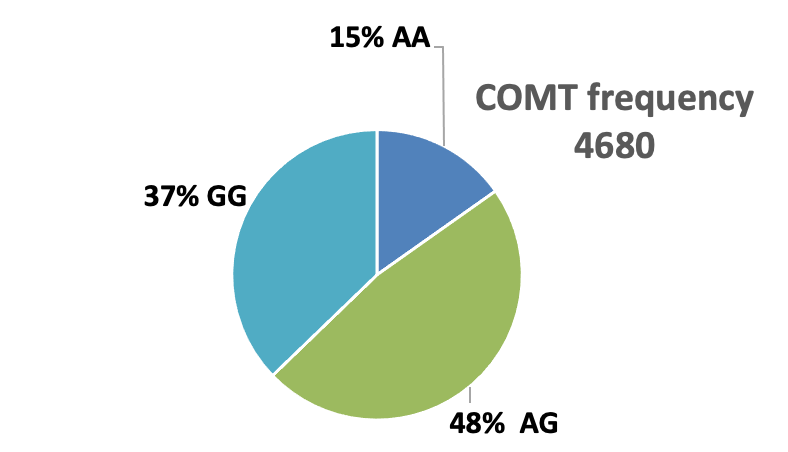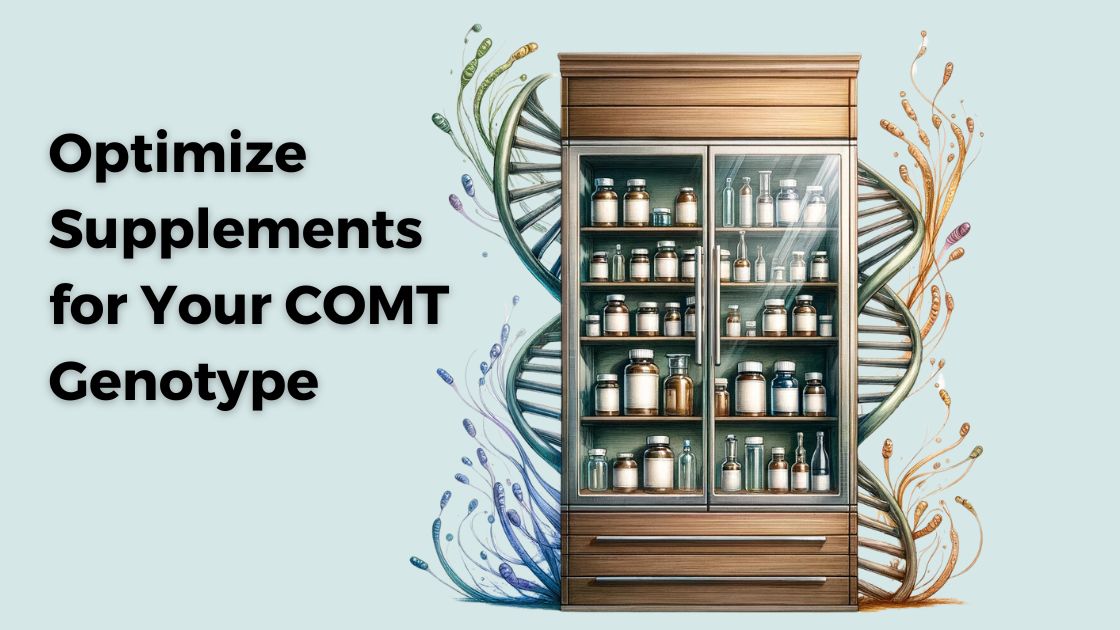Key takeaways:
~ The COMT enzyme can be slow or fast, depending on your genes.
~ Some people with slow COMT enzyme function have negative reactions to certain supplements.
~ Understanding your COMT SNPs can help you with deciding which supplements may work best for you.
COMT Genetics: SNPs, Neurotransmitters, and Supplements
Have you ever taken a supplement, such as methylfolate or methylB12, and noticed an immediate improvement in your mood? Only to have that rebound on you to the point that you are angry and irritable with everyone around you…
In this article, I’ll explain how some supplements can interact with COMT variants (COMT slow and fast SNPs).
The COMT gene encodes an enzyme called catechol-O-methyltransferase, which breaks down catechols.
What are catechols — and why do we need to break them down?
Catechols include neurotransmitters such as dopamine, epinephrine, and norepinephrine. Other catechols include estrogen metabolites as well as drugs and natural substances with a catechol structure.
The COMT enzyme plays an essential role in maintaining neurotransmitter levels at the right amount.
Without the COMT-controlled methylation reaction, catecholamines can accumulate and generate free radicals, which can damage DNA. Thus, COMT is essential in protecting cells, including brain cells, from oxidative stress.[ref]
How does COMT relate to methylation?
The methyl in catechol-O-methyltransferase (COMT) is because COMT uses a methyl group in the process of metabolizing catechols. Methyl groups are used in hundreds of reactions in the body, and adding a methyl group can change one substance to another. For example, serotonin is converted into melatonin through a process that involves adding a methyl group.
Symptoms of supplement interactions with COMT:
Everyone is unique, and genetics can play a big role in your response to natural supplements or dietary changes.
People with slow COMT enzyme variants may find that supplements that affect the methylation cycle can affect their neurotransmitter levels.
For example, high doses of methyl donor supplements may increase and then decrease the pool of methyl groups available for COMT to use in neurotransmitter reactions. A quick cycling of neurotransmitter levels could make someone irritable, angry, or anxious.
COMT also interacts with pain perception through neurotransmitter levels. Research shows that there can be interactions between slow COMT and medications in pain management.[ref]
More on this in a minute…
Before we go any further, check your genotype below to find out whether you have a slow or fast COMT gene (using your 23 and Me, AncestryDNA, or other genetic raw data).
COMT Genotype Report:
Not a member? Join here. Membership lets you see your data right in each article and also gives you access to the members’ only information in the Lifehacks sections.
🖨 Printable Overview (Members)
COMT rs4680, Val158Met variant: One of the most well-studied variants of the COMT gene is rs4680, often referred to as Val158Met.
How common are COMT polymorphisms?

The frequency of the slow or fast variants varies a little, depending on the population group. The G/G (fast) genotype is found in about 29% of Caucasians and about 52% of Chinese Han population groups. The A/A (slow) genotype is found in about 25% of Caucasians and about 10% of Chinese population groups.
Some websites label these variants with a +/+ or -/- and some use smiley faces, which is really confusing. Whether slower COMT is ‘good’ or ‘bad’ depends on the context. There are benefits and drawbacks to both slow and fast COMT enzyme function.
Related article: Deep dive into COMT and studies on mood, cognitive function, and more.
COMT and supplement sensitivity:
Now that you know your COMT genotype, let’s get into how this may affect your reaction to different supplements, combinations of supplements, and other medications.
Take all of this information as a ‘heads-up‘ to look for interactions or side effects.
This is NOT a “never take this supplement” list, but instead is an explanation of the circumstances that may cause interactions.
Supplements that inhibit COMT:
Member Content:
Why join Genetic Lifehacks?
~ Membership supports Genetic Lifehack's goal of explaining the latest health and genetics research.
~ It gives you access to the full article, including the Genotype and Lifehacks sections.
~ You'll see your genetic data in the articles and reports.
Join Here
Related Articles and Topics:
Lithium Orotate and Vitamin B12: Benefits for Mood and Cognitive Support
References:
Bodenmann, S., Xu, S., Luhmann, U. F. O., Arand, M., Berger, W., Jung, H. H., & Landolt, H. P. (2009). Pharmacogenetics of modafinil after sleep loss: Catechol-O-methyltransferase genotype modulates waking functions but not recovery sleep. Clinical Pharmacology and Therapeutics, 85(3), 296–304. https://doi.org/10.1038/clpt.2008.222
Branched chain amino acids selectively promote cardiac growth at the end of the awake period. (2021). Journal of Molecular and Cellular Cardiology, 157, 31–44. https://doi.org/10.1016/j.yjmcc.2021.04.005
Chen, J., Lipska, B. K., Halim, N., Ma, Q. D., Matsumoto, M., Melhem, S., Kolachana, B. S., Hyde, T. M., Herman, M. M., Apud, J., Egan, M. F., Kleinman, J. E., & Weinberger, D. R. (2004). Functional analysis of genetic variation in catechol-O-methyltransferase (Comt): Effects on mRNA, protein, and enzyme activity in postmortem human brain. American Journal of Human Genetics, 75(5), 807–821. https://doi.org/10.1086/425589
Chung, J.-O., Lee, S.-B., Jeong, K.-H., Song, J.-H., Kim, S.-K., Joo, K.-M., Jeong, H.-W., Choi, J.-K., Kim, J.-K., Kim, W.-G., Shin, S.-S., & Shim, S.-M. (2018). Quercetin and fisetin enhanced the small intestine cellular uptake and plasma levels of epi-catechins in in vitro and in vivo models. Food & Function, 9(1), 234–242. https://doi.org/10.1039/c7fo01576c
Dietary quercetin exacerbates the development of estrogen-induced breast tumors in female ACI rats. (2010). Toxicology and Applied Pharmacology, 247(2), 83–90. https://doi.org/10.1016/j.taap.2010.06.011
Hall, K. T., Buring, J. E., Mukamal, K. J., Vinayaga Moorthy, M., Wayne, P. M., Kaptchuk, T. J., Battinelli, E. M., Ridker, P. M., Sesso, H. D., Weinstein, S. J., Albanes, D., Cook, N. R., & Chasman, D. I. (2019). Comt and alpha-tocopherol effects in cancer prevention: Gene-supplement interactions in two randomized clinical trials. JNCI: Journal of the National Cancer Institute, 111(7), 684–694. https://doi.org/10.1093/jnci/djy204
Hall, K. T., Loscalzo, J., & Kaptchuk, T. J. (n.d.-a). Systems pharmacogenomics – gene, disease, drug and placebo interactions: A case study in COMT. Pharmacogenomics, 20(7), 529–551. https://doi.org/10.2217/pgs-2019-0001
Hall, K. T., Loscalzo, J., & Kaptchuk, T. J. (n.d.-b). Systems pharmacogenomics – gene, disease, drug and placebo interactions: A case study in COMT. Pharmacogenomics, 20(7), 529–551. https://doi.org/10.2217/pgs-2019-0001
Hall, K. T., Nelson, C. P., Davis, R. B., Buring, J. E., Kirsch, I., Mittleman, M. A., Loscalzo, J., Samani, N. J., Ridker, P. M., Kaptchuk, T. J., & Chasman, D. I. (2014). Polymorphisms in catechol-o-methyltransferase modify treatment effects of aspirin on risk of cardiovascular disease. Arteriosclerosis, Thrombosis, and Vascular Biology, 34(9), 2160–2167. https://doi.org/10.1161/ATVBAHA.114.303845
Kang, K. S., Yamabe, N., Wen, Y., Fukui, M., & Zhu, B. T. (2013). Beneficial effects of natural phenolics on levodopa methylation and oxidative neurodegeneration. Brain Research, 1497, 1–14. https://doi.org/10.1016/j.brainres.2012.11.043
Miller, R. J., Jackson, K. G., Dadd, T., Nicol, B., Dick, J. L., Mayes, A. E., Brown, A. L., & Minihane, A. M. (2012). A preliminary investigation of the impact of catechol-O-methyltransferase genotype on the absorption and metabolism of green tea catechins. European Journal of Nutrition, 51(1), 47–55. https://doi.org/10.1007/s00394-011-0189-0
Sak, K. (2017a). The Val158Met polymorphism in COMT gene and cancer risk: Role of endogenous and exogenous catechols. Drug Metabolism Reviews, 49(1), 56–83. https://doi.org/10.1080/03602532.2016.1258075
Sak, K. (2017b). The Val158Met polymorphism in COMT gene and cancer risk: Role of endogenous and exogenous catechols. Drug Metabolism Reviews, 49(1), 56–83. https://doi.org/10.1080/03602532.2016.1258075
Sak, K. (2017c). The Val158Met polymorphism in COMT gene and cancer risk: Role of endogenous and exogenous catechols. Drug Metabolism Reviews, 49(1), 56–83. https://doi.org/10.1080/03602532.2016.1258075
Scoditti, E. (2020). Neuroinflammation and neurodegeneration: The promising protective role of the citrus flavanone hesperetin. Nutrients, 12(8). https://doi.org/10.3390/nu12082336
The extra virgin olive oil phenolic oleacein is a dual substrate-inhibitor of catechol-O-methyltransferase. (2019). Food and Chemical Toxicology, 128, 35–45. https://doi.org/10.1016/j.fct.2019.03.049
Wang, L.-J., Lee, S.-Y., Chen, S.-L., Chang, Y.-H., Chen, P. S., Huang, S.-Y., Tzeng, N.-S., Chen, K. C., Lee, I. H., Wang, T.-Y., Yang, Y. K., & Lu, R.-B. (2015). A potential interaction between COMT and MTHFR genetic variants in Han Chinese patients with bipolar II disorder. Scientific Reports, 5, 8813. https://doi.org/10.1038/srep08813
Wang, P., Heber, D., & Henning, S. M. (2012). Quercetin increased the antiproliferative activity of green tea polyphenol (−)-epigallocatechin gallate in prostate cancer cells. Nutrition and Cancer, 64(4), 580–587. https://doi.org/10.1080/01635581.2012.661514

